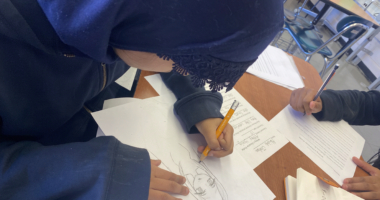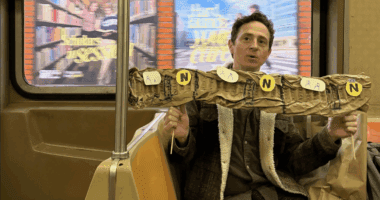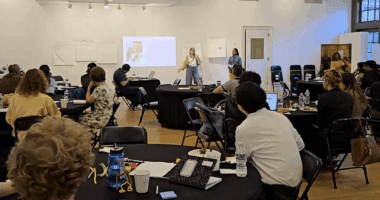Community-Word Project students at P.S. 132 put on a mid-year showcase recently. Friends, families, classmates, and school administration gathered in the school auditorium and saw these brave students recite and perform poems they’d spent weeks perfecting and they did a great job! This week, Teaching Artists, Elizabeth and Maria, asked the students in Ms. Amaro’s class to reflect on their performance, and they truly learned a great deal from the experience.
“I felt shy,” Genesis answered, in response to Elizabeth’s question of “How did you feel when you were on stage?”
“Me too,” Jada added. “I was a little nervous.”
“And what about when you were finished, did the nervousness go away?” Maria said, and Jada nodded her agreement. “Yeah, that’s normal. Being on stage can make anyone nervous, but now that it’s over, and you know what a good job you did- maybe you can remember that when we perform in May, so you won’t be so nervous then.” Everyone nodded.
“Can you think of anything else that might help you out, that you want to remember for May?” Elizabeth asked.
“To be brave,” volunteered a boy who I’d never heard speak before. “And to be respectful.”
“Good,” Elizabeth said. “Everyone did a great job of respecting the people on stage.”
“And the people in the audience,” the boy clarified. “And ourselves.”
BAM!
When I was a child I had a really bad lisp. My school referred me to speech therapy, but I somehow got it in my head that being pulled out of class for special services was like being branded for remedial assistance- so I refused to go. After being taunted repeatedly by classmates saying I spoke like Tweety bird, I decided to become mute. I still spoke at home, and to my friends at lunch, but you couldn’t get me to participate in class for anything.
My mother never forced me to participate or go to speech therapy. I always performed really well academically, and to her if I got good grades that was what was really important. She did want me to feel comfortable speaking, however, so everyday I was required to read aloud at home for an hour. I could read the funnies in the newspaper, one of my brother’s comic books, the TV guide, or my favorite, Goosebumps. By fourth grade my speech impediment had worked itself out for the most part, but it was the summer before then that really made me brave.
At the conclusion of third grade, my teacher, Mrs. Knight, gave me a beautiful diary covered in butterflies. Inside was an array of glittery stickers, a pen with my name engraved in it and a note. After all these years I can’t remember what it said exactly, and unfortunately I didn’t know at the time how much it would change my life. The gist was that I had to be brave and start participating in class, because I was way too smart to keep my knowledge to myself. Until I achieved that bravery, however, I should write down my ideas. I didn’t have to show the diary to anyone, and more importantlyb – I didn’t have to read the words, so I didn’t have to worry about saying them incorrectly.
I spent my entire summer writing, anything, and everything. When the next school year started I showed it to my best friend Toria who I hadn’t spoken to over the summer. She gushed over how exciting my summer was, how many details I’d included, and encouraged me to share my entries with some of our classmates. I was so excited by her excitement that I readily recited my misadventures, and by the time I realized I should be nervous because I was probably saying everything all wrong, my classmates were already commenting on how much fun I had. Michael, who lived around the corner, was more than happy to add parts I’d missed in our summer fun together.
I realized then the importance of words. Words gave me the freedom to express myself and I didn’t have to worry about anyone not understanding exactly what I was trying to say. I realized too that I was a good writer, and that people enjoyed hearing things I’d written. This made me more eager to volunteer to read my homework assignments, which eventually even gave way to me volunteering to read paragraphs in our textbooks. Before the year was over my hand was raised to answer every question, even when I wasn’t sure of the answer. Writing gave me that strength.
I have not noticed any students in Ms. Amaro’s class with speech impediments, but a few of them do have very strong accents. Whether it’s a lisp, an accent, a stutter, a stammer, or something altogether different, writing is always an excellent solution. Performing words that you have written for an audience only amplifies the power of the words.
My students are already feeling the pull of that power. Their excitement to create and the pride in their words is magnificent to behold. I look forward to seeing the many ways writing will benefit them. I know that they will continue to be brave, laying out their experiences and their souls for all the world to see. I will continue to assist and encourage them in any way I can; ensuring a future of brave creatives ready, willing, and able to take on anything.
-Tiffany Nesbit, Writer, TATIP Trainee



